Paul Yeung is a veteran in photographing social documentary. Working as a photojournalist for Reuters and Hong Kong Economic Times for more than seven years, Paul has covered countless news events, one of those turned into his photo series, ‘Flower Show’. Emulating Martin Parr’s street photography, he took faceless half body portraits of show-goer against a background highly saturated with walls of colourful flowers, turning a mundane photo news feature into a satire on consumerism and salon photography.
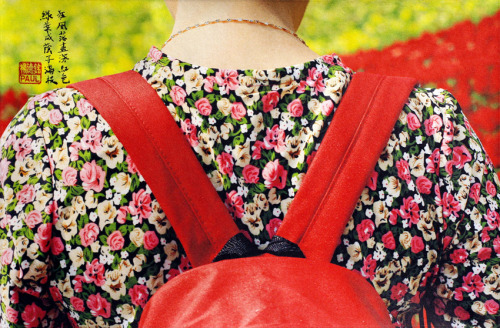
© Paul Yeung, from the series ‘Flower Show’
Growing up, have you ever imagined being a photographic artist?
Paul Yeung (PY): I have never thought about what I wanted to be in the future when I was young, let alone being a photographer. My secondary school teachers were surprised when they heard I have become a photojournalist, they had always thought that writing was my interest and strength. They were right, my interest in photography came late in my college years.
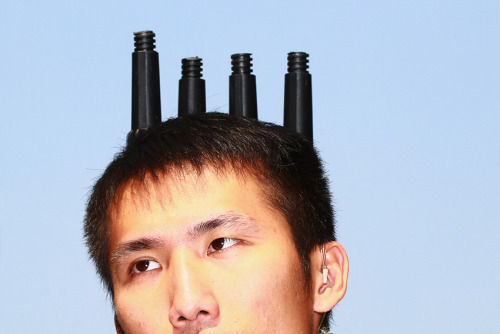
© Paul Yeung, from the series ‘Yes Madam, Sorry Ah Sir’
When did you start to see photography as an art form/ a way of expression?
PY: Around 2004 to 2005, I started taking black-and-white photographs with my small GR camera. I would upload them on my blog with some footnotes. It was my little online haven of personal expression and creativity outside of my journalistic work. I started consciously planning photographic projects around 2007 to 2008 while working for a magazine. Inspired by foreign photographers, I started using photography as a creative medium to explore societal motifs. I shot ‘The Collapse of the Fuwa Empire’ in 2008 and ‘The Advertising Billboard is nothing’ in 2009.
Is art school training important to your photography?
PY: Frankly speaking, I was quite disappointed with my postgraduate program as I expected a formal art school training. But in hindsight, I think the flexible syllabus and the intuitive teaching method made me realise that art is unbounded by methodology nor theory. For me, academic training is not as important. On the contrary, it was the exhibitions and short-term seminars I attended, such as Gillian Wearing’s and Taryn Simon’s, that widened my horizon.
Your ‘Flower Show’ series is one of your signature project, an alternative and humoured approach to cover commercial events. What idea did you originally have for the project? Did you expect the project to grow into a solo exhibition in Blindspot Gallery?
PY: Throughout my career, almost every year, I have to do a feature story on flower shows.Two particularly interesting phenomena stands out in years of observation. One, many visitors wore floral patterned clothes to the shows. Two, Many show-goers came to the flower show only to take pictures. Deeply inspired by British photographer Martin Parr, I attempted to cover the event in an humoured and sarcastic approach, capturing consumerism in Hong Kong through my lens. I never thought these photographs would turn into a photo exhibition. That was something I did not expect.
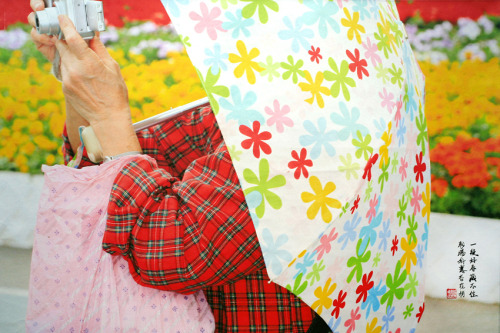
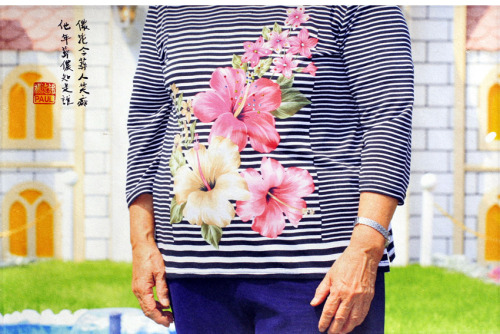
© Paul Yeung, from the series ‘Flower Show’
How is your general research process for your projects?
PY: I wanted to make a photojournalistic documentary to chronicle social event but also respond to the transition of photographic art and culture. ’Flower Show’ is a comment on prevailing salon photography aesthetic in Hong Kong. In my work, I magnify the formality of salon photography to ridicule this form of grandiose photographic expression.
I intentionally imitated the personal style, picturesque compositions and presentation format of Lang Jingshan, one of the earliest Chinese photojournalists, embellishing my photos with Chinese calligraphy and flower-related poetry. I later mounted them in Chinese hanging scrolls.
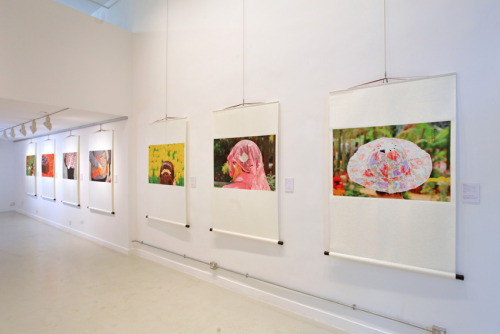
© Installation view ‘Flower Show’
You were a photojournalist for Reuters and Hong Kong Economic Times for more seven years before doing more art-based project, How does your working experience affect your photography?
PY: Years of working in news agencies put me in the frontline of social events and gave me a deeper understanding of the people and the society. They have become the most important sources of inspiration. A lot of my works are informed by the social reality. The core of my work is documentary, with a touch of personal expression and my philosophy on photography. In ‘Flower Show’, I incorporated deadpan photography, a humoured perspective and my commentary on traditional photography. My recent conversation exhibition with Enoch Cheung at Lumenvisum ‘Outside Forces’ (《勾犀科實》) is a project built upon Umbrella Movement, combining my personal opinion of ‘foreign intervention’ and supernatural powers to investigate the authenticity of forensic photography’ in the language of photographic evidence.
Long-term photojournalistic projects are prevalent in China, US and other western countries, why is slow journalism so rare in Hong Kong?
PY: First of all, Hong Kong bustling lifestyle, high living cost and lack of retirement welfare system have cultivated a conservative life philosophy. People tend works hard to keep their regular 9-to-5 job. Photographers grew up in this culture tend to lack patience for long social documentary. Even if they do, the social reality does not allow the time and freedom needed to develop long-term photojournalistic projects when a lot of them can barely make ends meet.
Besides, Hong Kong lacks platform and organisation to help emerging photojournalists. There are only few local residency and fellowship programmes for photographers. One of the more established one would be ‘SoCO’. The local agency advocates social changes through photo documentary. However, having limited resources, programmes are mostly run by tenacious volunteers. Depending on public donation, the organisation have a tendency to run programmes that entertain a more mainstream audience. The organisation has since drifted away from its original aim: to inspire social changes through a ten-year-long photo documentary of children living in poverty.
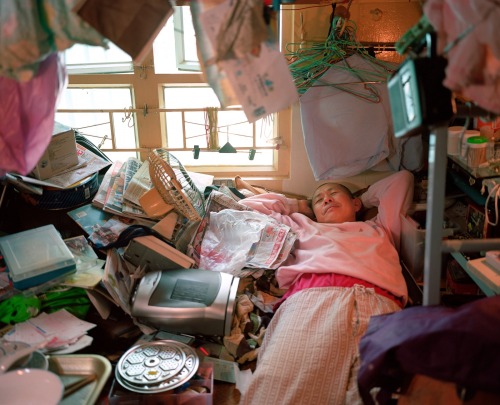
© Dustin Shum from the series ‘Life and Times’
Hong Kong also lacks audience for this kind of long-term social documentary. I would say the majority of Hong Kongers are rather indifferent to social issues and politics. On the other hand, visual education is often neglected or dismissed entirely, leading to a relatively low demand for photography projects like this.
That being said, there are still plenty of excellent long-term photo documentary in Hong Kong, such as ‘West Kowloon Paradise’ (《西九龍填海區》) by Ducky Tse (謝至德), ‘Homeless’ series (《野宿》) by Lei Jih-sheng (雷日昇), ‘Under Heaven’ (《在天堂之下》) by Chun Wai (秦偉), Dustin Shum (岑允逸)’s ‘Life and Times’(《活一生人》) and ‘We Live’ (《活著》) by Lam Chun Tung (林振東).
What is the current photographic project you are working on? Can you tell us more about it?
PY: I have been photographing mainstream commercial exhibitions food expos, book fairs, wine fairs and flower shows for years. My work explores blind consumerism and a collective lack of critical thinking on the advanced capitalistic society we live in.
I am also working on another documentary about Police Force in Hong Kong. I am currently preparing to publish a photo book and an exhibition at the moment.
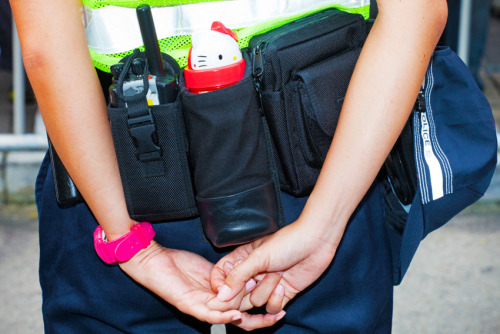
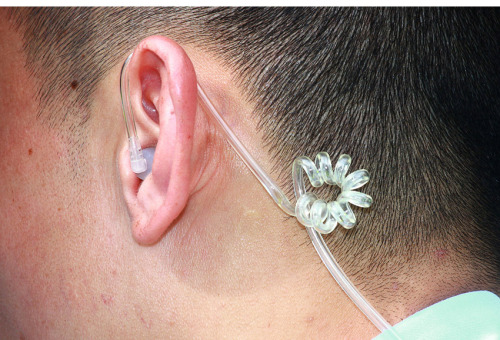
© Paul Yeung, from the series ‘Yes Madam, Sorry Ah Sir’
How does Hong Kong inspire you artistically? Living in a city with such dense visual elements, does it influence your aesthetic and artistic thinking?
PY: Hong Kong is essential to my photography. I cannot create outside of it. That is exactly what happened when I was studying in the UK. Yet, I feel I do not fit in the city at times. I would say I am a ‘half-outsider’. I belong to here yet I keep a certain distance from it. You can see this sentiment throughout my work.
For every social issues that I resonate with, I photograph from a relatively personal standpoint. I am drawn to fun, imitation and dark humour. Much like a low budget local film production, I value personal expression over epicness.
---
LINKS
Hong Kong
share this page